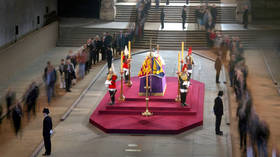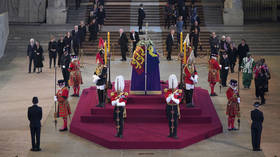Westminster Hall damaged during Queen’s funeral

The flooring of the ancient Westminster Hall was damaged by the “high-level of continuous footfall” when over a quarter of a million people bid their final farewell to Queen Elizabeth II, a House of Lords spokesperson revealed on Monday.
“As a consequence of the high-level continuous footfall through Westminster Hall during the lying-in-state some delamination to the Yorkstone floor has occurred,” the spokesperson told British media, adding that the damage did “not present a structural risk.”
The excessive flow of people even “exposed some areas of bare stone,” the spokesperson explained. The worn-out patches of the stone flooring are expected to “blend in with the surrounding areas over time,” he added.
Elizabeth II, who died on September 8, was the longest-ruling British monarch, having occupied the throne for more than 70 years. The Queen’s coffin was put on display at Westminster Hall for some five days, with over 250,000 people visiting the ancient building to pay their final respects to the late monarch.
Constructed in the late 11th century, the hall has been renovated multiple times by different British rulers over its history. The current floor is made of Yorkstone, a variety of sandstone mined in Yorkshire, and is relatively ‘new’, having been installed only in the 1830s.













